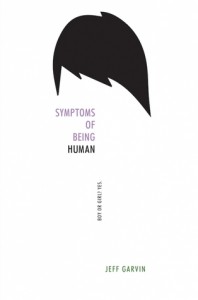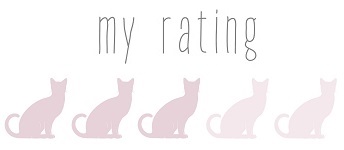Four Thoughts on Symptoms of Being Human by Jeff Garvin

 What: Symptoms of Being Human by Jeff Garvin
What: Symptoms of Being Human by Jeff Garvin
Who: Balzer + Bray
When: February 2nd 2016
How: A copy of this novel was provided by HarperCollins for review via Edelweiss.
The first thing you’re going to want to know about me is: Am I a boy, or am I a girl?
Riley Cavanaugh is many things: Punk rock. Snarky. Rebellious. And gender fluid. Some days Riley identifies as a boy, and others as a girl. The thing is . . . Riley isn’t exactly out yet. And between starting a new school and having a congressman father running for reelection in uber-conservative Orange County, the pressure—media and otherwise—is building up in Riley’s so-called “normal” life.
On the advice of a therapist, Riley starts an anonymous blog to vent those pent-up feelings and tell the truth of what it’s REALLY like to be a gender-fluid teenager. But just as Riley’s starting to settle in at school—even developing feelings for a mysterious outcast—the blog goes viral, and an unnamed commenter discovers Riley’s real identity, threatening exposure. Riley must make a choice: walk away from what the blog has created—a lifeline, new friends, a cause to believe in—or stand up, come out, and risk everything.
 I had four major thoughts when reading Symptoms of Being Human:
I had four major thoughts when reading Symptoms of Being Human:
1) As readers, we are never told if Riley was assigned female at birth (AFAB) or assigned male at birth (AMAB). Now, I think this is the case because the author perhaps wanted to give the reader a message, that it is none of your business whether or not someone who identifies as gender fluid (or any gender identity) was AFAB or AMAB. Which is true, entirely. But on the other hand, it meant that a lot of important discussions were never included in the story.
For example: pronouns. Pronouns are very important, and Riley never really mentioned them at all, because what pronouns people used to refer to Riley were never explicitly stated. I found this to be kind of an erasure of the importance of pronouns. What pronouns did Riley prefer? And what if Riley’s preferred pronouns were not the ones that everyone used to refer to Riley? For example, Riley’s mom introduces Riley to someone, and it was just written as “mom made the introductions”. Now, parents usually say something along the lines of “this is [name], my son/daughter”. Assuming that Riley’s mom fell into this age old pattern, how did she refer to Riley, and more importantly: how did Riley feel about being introduced and referred to as a son or daughter (both of which are pretty binary concepts)?
I also think that discussions about the dysphoria that Riley felt almost every day were a little confined, as well. When referring to Riley’s body, Riley simply mentioned curves and edges. I don’t identify as trans, so keep in mind that these are the thoughts of a cis person, but I think that the fact that Riley’s thoughts on Riley’s body would have been more precise than how they were presented – especially in terms of parts of the body that are so heavily associated with gender in society.
Things like this are really important, and I felt that through the concealment of whether or not Riley was AFAB or AMAB left a lot of room for discussions that were unfortunately absent.
2) Bec was, for the most part, Riley’s manic pixie dream girl. Opening doors for Riley, and introducing Riley to new and ~amazing~ things. I am not a fan of the manic pixie dream girl trope, and I was disappointed to find that it was in Symptoms of Being Human. I didn’t really like Bec’s character much at all, and didn’t really understand why Riley was so keen on her, especially after what happened towards the end of the novel.
3) Riley has an online blog (kind of like a Tumblr), and writes a few blog posts about being gender fluid. I kind of felt like these blog posts were more of a way to explain what being gender fluid means, rather than to move the plot along at all. There were some important plot points that came from Riley’s blog, but sometimes it felt more like an information device than anything else.
4) Riley is bullied by a girl (who I cannot remember the same of – I think it started with S), and repeatedly tries to engage with her. DO NOT ENGAGE. I don’t understand why the heck Riley would want to be in the same room as a person to referred to Riley as “it”, let alone try to get her to open up about her problems. It may be cynical of me to say, but fuck her problems. I don’t care if she’s going through the worst time of her life – it doesn’t give her an excuse to shit on people to make herself feel better. I don’t think trying to connect to a bully is ever the way to go, and I didn’t really feel like this was a great message being put across.
~
It might seem like I didn’t like this book, but I really did. I liked Riley, and most of the storyline (although, take care to read the trigger warnings for this one, please), and I really believe that this book is incredibly important.
© 2016, Chiara @ Books for a Delicate Eternity. All rights reserved.
trigger warning: medicated depression and anxiety, bullying, harassment, stalking, transphobia/biphobia/homophobia, physical assault, sexual assault/rape, attempted suicide, and suicide in this novel








While with its flaws I am really interested in this book. I’ve yet to read a book on gender fluid people. Thanks for sharing your thoughts ! :)
Oh, it’s definitely worth the read! No problem, lovely :)
Sorry some things didn’t work for you, but glad you enjoyed it nonetheless. I’ve heard great things about this book and I hope it gets the attention it deserves because it looks like a really important book.
I definitely enjoyed it! And I REALLY HOPE it does get a lot of attention, because it is super important. Even though there was room for more discussion, it covers a lot of topics in really thoughtful ways!
Jenna told me a bit about the book and some of the interesting behaviour from it too, so I think ultimately it’s one of those education books about an issue we don’t know anything about. I can definitely see the issue of pronouns though, it’s kind of an important part to be addressed? Love your review Chiara!
I definitely think it’s an important book in general, and especially for people who don’t understand/know a lot about gender fluidity! But yeah, the lack of talk on pronouns was a bit problematic.
Thank you, lovely! <3
I do really want to read this one. It does seem like not stating whether Riley was born a boy or girl did leave out a lot issues and topics that could have discussed. At the same time, I love that there is a book out there that talks about being gender fluid. I hope there continue to be LGBT+ books like these and hopefully each of them will discuss something new and different about these topics that need to be out there!
lauren
It’s a very important book! And I suppose there were pros and cons to not clarifying if Riley was AMAB or AFAB. I really hope that LGBTQIA+ novels increase in popularity and numbers, as well! And each book does bring new discussions to the table, which is amazing.